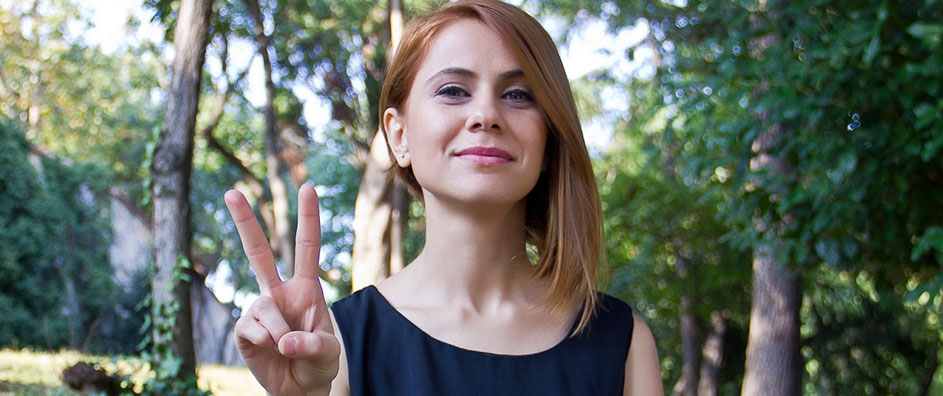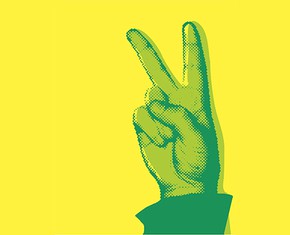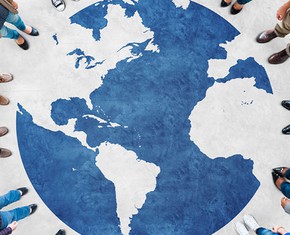The views expressed in our content reflect individual perspectives and do not represent the authoritative views of the Baha'i Faith.
Let us then pursue what makes for peace and mutual understanding. – Romans 14:19.
Resolutely train yourself to attain peace. – Buddha, the Utthana Sutta of the Sutta Nipata.
Blessed are the peacemakers, for they shall be called sons of God. – Mathew 5:9.
The worshippers of the All-Merciful are they who tread gently upon the earth, and when the ignorant address them, they reply, “Peace!” – Qur’an 25:63.
Be thou of those who foster peace. – Abdu’l-Baha, Selections from the Writings of Abdu’l-Baha, p. 26.
The world’s great Faiths all teach peace—so how can we each become peaceful? How can we, as the Buddha put it, resolutely train ourselves to attain peace; and, as Abdu’l-Baha put it, be of those who foster peace? Beyond being a peaceful person—abstaining from anger and violence—how do we personally foster peace in our families, our cities and our world?
The Baha’i teachings have many suggestions for personally fostering peace. For this article, I’ve chosen to focus on three:
- Do everything you can to help spirituality grow in the world.
- Have hope—believe in your heart that peace is possible.
- To multiply your efforts, join a global group of peace-loving people.
In today’s world, we’ve made enormous material and technological progress—but it hasn’t been matched by a parallel level of spiritual progress:
I want to make you understand that material progress and spiritual progress are two very different things, and that only if material progress goes hand in hand with spirituality can any real progress come about, and the Most Great Peace reign in the world. If men followed the Holy Counsels and the Teachings of the Prophets, if Divine Light shone in all hearts and men were really religious, we should soon see peace on earth and the Kingdom of God among men. The laws of God may be likened unto the soul and material progress unto the body. If the body was not animated by the soul, it would cease to exist. It is my earnest prayer that spirituality may ever grow and increase in the world, so that customs may become enlightened and peace and concord may be established. – Abdu’l-Baha, Paris Talks, pp. 107-108.
Of course, we can all start with ourselves, fostering our individual spiritual progress with meditation, prayer and a consistent practice of studying sacred scriptures. But that’s just the beginning. To truly spread spirituality requires radiance. When you radiate spiritual happiness and contentment, others will inevitably want some.
Which leads us to the second way to foster peace: hope. Many, many people have lost their hopes for peace, falling victim to the cynical idea that humans have always had war and violence, and therefore always will. The Baha’i teachings reassure humanity that we still have reason for enormous hope:
The Baha’i Faith regards the current world confusion and calamitous condition in human affairs as a natural phase in an organic process leading ultimately and irresistibly to the unification of the human race in a single social order whose boundaries are those of the planet. The human race, as a distinct, organic unit, has passed through evolutionary stages analogous to the stages of infancy and childhood in the lives of its individual members, and is now in the culminating period of its turbulent adolescence approaching its long-awaited coming of age.
A candid acknowledgement that prejudice, war and exploitation have been the expression of immature stages in a vast historical process and that the human race is today experiencing the unavoidable tumult which marks its collective coming of age is not a reason for despair but a prerequisite to undertaking the stupendous enterprise of building a peaceful world. – The Promise of World Peace, The Universal House of Justice, October, 1985.
So, we can have legitimate hope—but we don’t have to act on our hope by ourselves. No one person, no matter how powerful, committed and radiant, can undertake that “stupendous enterprise” and foster peace by themselves. It will take a phalanx of people, a cohesive group united in international cooperation across the planet, to build a peaceful world. Which brings us to the third way to foster peace: join a global group of peace-loving people:
The primary question to be resolved is how the present world, with its entrenched pattern of conflict, can change to a world in which harmony and co-operation will prevail.
World order can be founded only on an unshakeable consciousness of the oneness of mankind, a spiritual truth which all the human sciences confirm. Anthropology, physiology, psychology, recognize only one human species, albeit infinitely varied in the secondary aspects of life. Recognition of this truth requires abandonment of prejudice — prejudice of every kind-race, class, colour, creed, nation, sex, degree of material civilization, everything which enables people to consider themselves superior to others. – Ibid.
When you think about joining forces with that group of global peacemakers, consider the Baha’i movement:
There is still another kind of movement or cause which from a very small, inconspicuous beginning goes forward with sure and steady progress, gradually broadening and widening until it has assumed universal dimensions. The Baha’i Movement is of this nature. …at the beginning the Cause of Baha’u’llah was almost unknown, but on account of being a divine Movement it grew and developed with irresistible spiritual power until in this day, wherever you travel — East or West — and in whatever country you journey, you will meet Baha’i assemblies and institutions. This is an evidence that the Baha’is are spreading the blessings of unity and progressive development throughout the world under the direction of divine guidance and purpose… – Abdu’l-Baha, The Promulgation of Universal Peace, p. 44.
Next: Want Friends? Be Trustworthy
You May Also Like
Comments

















Peace Officers use the least amount of force to control violent citizens and do not intend to harm the citizen. Every society has citizens who violate the law. Officers are trained in the use of force to control these citizens. Train your children in Use of Force techniques through a police agency.
We now have "Anti-bullying" rules which are a step in the right direction. The idea is not to fight the bully, but to report him. As ...we become adults we have the same problem in society, bullies. Officers have been trained to deal with these social bullies or criminals using the least amount of force.
After 20 years as a peace officer and as a state certified instructor and having taught hundreds of officers on the Use of Force, I have come to the conclusion that "Lethal Force" is Not needed.
You just made my day!
Preamble
We, the constituent organizations and members of the Soka Gakkai International (hereinafter called "SGI"), embrace the fundamental aim and mission of contributing to peace, culture and education based on the philosophy and ideals of the Buddhism of Nichiren Daishonin.
We recognize that at no time in history has humankind experienced such an intense juxtaposition of war and peace, discrimination and equality, poverty and abundance as in the twentieth century; that the development of increasingly sophisticated military technology, exemplified by nuclear weapons, ...has created a situation where the very survival of the human species hangs in the balance; that the reality of violent ethnic and religious discrimination presents an unending cycle of conflict; that humanity's egoism and intemperance have engendered global problems, including degradation of the natural environment and widening economic chasms between developed and developing nations, with serious repercussions for humankind's collective future.
We believe that Nichiren Daishonin's Buddhism, a humanistic philosophy of infinite respect for the sanctity of life and all-encompassing compassion, enables individuals to cultivate and bring forth their inherent wisdom and, nurturing the creativity of the human spirit, to surmount the difficulties and crises facing humankind and realize a society of peaceful and prosperous coexistence.
We, the constituent organizations and members of SGI, therefore, being determined to raise high the banner of world citizenship, the spirit of tolerance, and respect for human rights based on the humanistic spirit of Buddhism, and to challenge the global issues that face humankind through dialogue and practical efforts based on a steadfast commitment to nonviolence, hereby adopt this charter, affirming the following purposes and principles:
The SGI’s activities for peace are based on the following key elements derived from the life-affirming philosophy of Nichiren Buddhism: Dignity of Life All people inherently possess a life-state of ultimate dignity and in this sense are fundamentally equal and have limitless potential. Interconnectedness of Life An awareness of the interrelatedness and inseparability of one’s own life and the following principles and purposes:
Purposes and Principles
SGI shall contribute to peace, culture and education for the happiness and welfare of all humanity based on Buddhist respect for the sanctity of life.
SGI, based on the ideal of world citizenship, shall safeguard fundamental human rights and not discriminate against any individual on any grounds.
SGI shall respect and protect the freedom of religion and religious expression.
SGI shall promote an understanding of Nichiren Daishonin's Buddhism through grass-roots exchange, thereby contributing to individual happiness.
SGI shall, through its constituent organizations, encourage its members to contribute toward the prosperity of their respective societies as good citizens.
SGI shall respect the independence and autonomy of its constituent organizations in accordance with the conditions prevailing in each country.
SGI shall, based on the Buddhist spirit of tolerance, respect other religions, engage in dialogue and work together with them toward the resolution of fundamental issues concerning humanity.
SGI shall respect cultural diversity and promote cultural exchange, thereby creating an international society of mutual understanding and harmony.
SGI shall promote, based on the Buddhist ideal of symbiosis, the protection of nature and the environment.
SGI shall contribute to the promotion of education, in pursuit of truth as well as the development of scholarship, to enable all people to cultivate their individual character and enjoy fulfilling and happy lives.
The SGI Charter was adopted by its Board of Directors on 16 October, 1995